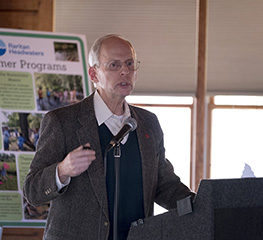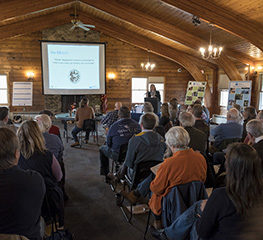 Gray, drizzly days like the ones New Jersey had in abundance in 2018 aren’t much fun. But they’re excellent for one thing: recharging groundwater supplies.
Gray, drizzly days like the ones New Jersey had in abundance in 2018 aren’t much fun. But they’re excellent for one thing: recharging groundwater supplies.
“Silver lining, folks,” water expert Dr. Daniel Van Abs told the crowd at Raritan Headwaters Association’s State of Our Watershed conference in Califon on Dec. 1.
Persistent gentle rains will become increasingly valuable in the future, as climate change turns New Jersey’s weather more volatile, said Van Abs, a Rutgers University professor who was the conference’s keynote speaker.
“Climate change will affect our water resources,” said Van Abs. “Fear of Armageddon is misplaced, but so is complacency.”
According to Van Abs, the Rutgers Climate Institute predicts greater variability in New Jersey’s weather in the coming decades.
Hotter Temperatures, More Rain
Warmer average temperatures are expected in all seasons, but they will be most noticeable in the summer. New Jersey’s climate, he said, will eventually be like Georgia’s is now.
Precipitation will be higher, but more of it will come from intense storms. These storms don’t help groundwater recharge as much as gentle rain, Van Abs explained, because much of the water from intense storms runs off before it can be absorbed into the soil.
Warmer temperatures will extend New Jersey’s growing season in the future, he said, but at the same time it will strain groundwater supplies. Higher temperatures mean more evaporation, making soils drier. This, in turn, will reduce stream flows, because most streams are dependent on groundwater to maintain their levels.
Most groundwater recharge occurs in late autumn, from the time leaves fall from trees until the ground freezes, and again in the spring before trees leaf out and start using more water. A shorter and milder winter would increase groundwater recharge potential, Van Abs said, but a longer growing season would offset gains.
 Sufficient groundwater recharge is essential in the upper Raritan River watershed, Van Abs said, because 80 percent or more of annual stream flow comes from groundwater. Well water supplies also depend on groundwater recharge: four out of five households in the watershed depend on well water.
Sufficient groundwater recharge is essential in the upper Raritan River watershed, Van Abs said, because 80 percent or more of annual stream flow comes from groundwater. Well water supplies also depend on groundwater recharge: four out of five households in the watershed depend on well water.
“Without recharge, everything else falls apart,” Van Abs warned.
Climate Already Changing
The increase in precipitation is already occurring, he noted; New Jersey’s annual rainfall has been steadily climbing since the 1970s.
But the increase in precipitation doesn’t mean that droughts will become a thing of the past. The Rutgers Climate Institute believes drought frequency will also increase, with shorter but more intense droughts. This is a risk to the state’s water supply, he said, because most reservoirs are fairly shallow and have limited storage.
Not only will summer days be hotter due to climate change, Van Abs said, but nights will be as well, meaning streams won’t have as much of a chance to cool down overnight. Water holds less oxygen at higher temperatures, so stress will be placed on cold water species like trout. Warmer water also increases algae growth, further diminishing stream quality.
Taking Action
What can be done to minimize the impacts of climate change to water supplies?
“Climate change will help force us to access, manage and use our water resources differently,” said Van Abs. “We need to rethink our society, making sustainable water resources a critical part of the mix.”
Among the actions that can be taken:
- Anticipate climate change and plan for development in the appropriate places
- Increase “green infrastructure” like rain gardens and bioswales that slow stormwater runoff.
- Encourage water conservation, especially in intensive outdoor uses like lawn irrigation
- Think of all water as a resource, including stormwater and wastewater
“We need to recognize that change is coming – that change is here, in fact,” said Van Abs. “There is no issue of belief or non-belief (in climate change). It’s like believing or not believing in Saturday. I believe in Saturday.”
About Raritan Headwaters
Raritan Headwaters has been working since 1959 to protect, preserve and improve water quality and other natural resources of the Raritan River headwaters region through efforts in science, education, advocacy, land preservation and stewardship. RHA’s 470-square-mile region provides clean drinking water to 300,000 residents of 38 municipalities in Somerset, Hunterdon and Morris counties and beyond to some 1.5 million homes and businesses in New Jersey’s densely populated urban areas.
Raritan Headwaters recently was accredited by the national Land Trust Accreditation Commission, meaning it has been recognized as a strong and effective organization committed to professional excellence and maintaining the public’s trust.
To learn more about Raritan Headwaters and its programs, please visit www.raritanheadwaters.org or call 908-234-1852.



